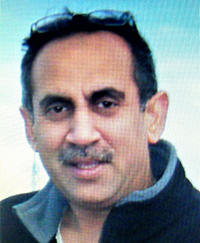Since moving to the UK in 1991, first living and working amongst a diverse community as a doctor in London and now Wales, I have witnessed injustice and discrimination based on ethnic backgrounds throughout my career and personal life, and I have worked hard to change this.
At the heart of the matter – and the huge challenge we face – is representation. We need to see more people from diverse ethnic backgrounds come together and make a difference; without a united front I fear we will continue to face barriers including stifled career progression, discrimination and exploitation.
A significant proportion of NHS staff in Wales alone are from culturally diverse backgrounds. Without us the health service would come to a grinding halt, an unbearable thought, especially during a pandemic. The COVID-19 pandemic has demonstrated this great divide with a large and disproportionate (nine in 10 doctors) of BAME origin dying from the disease in the UK.

Recent surveys indicated that ethnic minority doctors were twice as likely to say they felt under pressure to see patients without adequate PPE (personal protective equipment), and three times more likely to say they were afraid to speak out about PPE, medicine, or staff shortages for fear of recrimination, or harming their career. A stark reminder of the inequalities we face.
I was born in Mumbai. My wife and I, both clinicians, first came to the UK after completing our postgraduate in speciality studies in India. Having come here on a double sponsorship scheme, starting as a registrar and completing the Diplomate in Urology at UCH, London, I thought I would be able to move up the career ladder.
Overcoming hurdles
I soon discovered it wasn’t that easy. The reason for this, in my view, being that we were foreign graduates and not products of the local system, which seemed to mirror the experiences of other ethnic minority doctors we knew. In my career I found the obstacles and hurdles that were put up were not overt, but I felt they were clear in their motives, which was essentially to prevent progression. The general feeling is that fewer ethnic minority doctors are promoted to senior posts.
Since settling in Wales I have tried to get involved and contribute as best I can towards work that would help people from diverse backgrounds to connect with each other, and feel valued here in Wales through community groups. This is something I would like to build on in my role as co-chair of the BMA Cymru Wales BAME forum.
Building on some of the work already done by different LNCs (local negotiating committees) across Wales, I think we could do more to provide holistic services – for example, mentors or buddies for people coming from overseas, to help familiarise them with the area they are going to work in. This could be extended to activities outside of work, such as introducing them to other families or religious community groups, so they can be part of local festivities and most of all, feel welcome.
As a BMA member for nearly two decades, I have been supported by the union during my career in the UK, and I’m pleased the BMA has responded to calls from the membership to provide greater support for doctors and medical students from black, Asian and minority ethnic backgrounds, but I feel there is a lot more to be done.
Through the BAME forum I would like us to join together and tackle issues head on.
I am pleased the BMA has been involved in negotiating the new ‘respect and resolution’ policy, which will replace the grievance and ‘dignity at work’ procedures. This should support BAME staff in resolving issues at the earliest opportunity with their employer and avoid the lengthy processes which can have a significant impact on the individual’s health and career.
I want to see real change; I want us to walk the walk and not just talk the talk, and we need to hear from people who live these experiences, otherwise it will be difficult for us to make a difference. In a decade or so I will retire, and we need to make the next generation feel wanted in Wales and the UK – if we don’t, they will move abroad and leave us with a sparse population of few trained doctors.
Truly representative
With a growing membership of 30 currently in the forum, we’re seeing incremental progress, but this is still only a small proportion of BAME doctors in Wales, and we need to build on this – with doctors from all backgrounds.
In our last BAME forum meeting on 11 May, Helen Arthur, director of the NHS Workforce in Wales, presented the Welsh Government’s Race Equality Action Plan. This experience has resulted in a direct dialogue with Helen, who invited members to contact her with feedback and their experiences and insight to help make an impact in this area.
To make real progress, we want as many doctors as possible to join us. Contact Dorine Chantepie by email to register your interest in joining the forum.
Amol Pandit is a urologist at Swansea Bay University Health Board, co-chair of the BMA’s BAME forum in Wales and member of the Welsh BMA council
References:
BMA COVID-19 member tracker surveys and BAME doctors hit worse by lack of PPE
Appleby, J., BMJ (2018) Ethnic pay gap among NHS doctors

